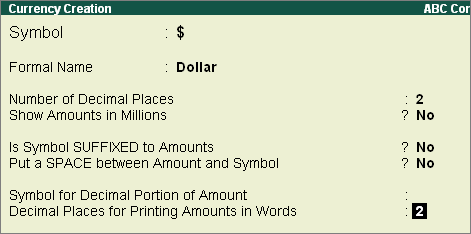
To create a foreign currency
Go to Gateway of Tally > Accounts Info. > Currencies > Create

Enter the currency symbol in Symbol field. This symbol appears in your reports, wherever applicable.
Use ASCII Special Characters with [Alt] key combination, if your keyboard does not have the symbol. Utilities like Character Map (Start > All Programs > Accessories > System Tools) in Windows, shows the key combination for most symbols. This might be different on some notebook computers, refer to the computer's user manual or the vendor.
You cannot assign a duplicate currency symbol for a company in Tally.ERP 9.
The Key combinations for a few currency symbols are given below:
Alt + 156 –Pound Sterling - £
Alt + 0165 – Japanese Yen - ¥
Alt + 0128 – Euro - €
Use the Dollar and the Rs. Symbol from the keyboard
Enter the name of the currency in Formal Name. e.g., US Dollars, Pound Sterling, Indian Rupees, Omani Rial and so on.
A formal name is required to distinguish different currencies with the same symbols. For e.g. Assume you have created two companies (ABC & XYZ) in Tally.ERP 9. ABC and XYZ have different set of currencies. ABC uses symbol $ for Australian Dollars and XYZ uses the symbol $ for U.S. Dollars. The formal name distinguishes two different currencies with the same symbol, when you compare Books of Accounts of the two companies.
The company that is loaded first retains the original symbol for display purposes. The other company's currency symbol will be prefixed with the first letter/first few letters (to make it unique) of the formal name. Here, if ABC is loaded first then the symbol $ is for Australian Dollars and in XYZ (loaded next) the symbol $ is prefixed with the letter U (first letter of its formal name).
Note: You cannot assign a duplicate Formal Name for a currency in Tally.ERP 9.
Enter the number of decimal places for the currency in Number of Decimal Places. E.g. Currencies with 2 decimal places like paisa and currencies with three decimal places like dinar. There are currencies that do not have decimal places, e.g., Vietnamese Dong.
Tally.ERP 9 has two formats for displaying an amount, viz., in millions and in lakhs. 1000000 (one followed by six zeroes) in millions format would appear as 1,000,000 and lakhs would appear as 10,00,000.
Select the required parameter in Show Amounts in Millions field. If you select No, the amounts will appear in Lakhs, by default.
Note: You can always specify the appearance of numbers in specific reports, e.g. In Profit & Loss Account display, press F12: Configure to change scale factors for values.
Set Is Symbol SUFFIXED to Amounts to Yes for the symbol to appear after the amount. Set it to No, for the symbol to be prefixed to the amount.
Set Put a SPACE between Amounts and symbol? to Yes to apply a space between amounts and symbol.
Enter the Symbol for Decimal portion of currency in Symbol for Decimal Portion of Amount field. Eg., Ps. for Paise.
Enter the number of decimal places for printing the amounts in words in Decimal Places for Printing Amounts in Words field. This number should be equal to or lesser than the number specified in Number of Decimal Places field.
Note: The Currency cannot be translated or transliterated but will appear in the Language created.
Buttons available in the Currency creation/alteration screen:
|
Buttons |
Keys |
Description and usage |
|
G: Groups |
Ctrl+G |
User is allowed to create Accounting Group from the Currency Creation/Alteration screen. |
|
L: Ledgers |
Ctrl+L |
User is allowed to create Accounting Ledgers from the Currency Creation/Alteration screen. |
|
S: Cst Cat |
Ctrl+S |
User is allowed to create Cost Category from the Currency Creation/Alteration screen. |
|
C: Cst Ctr |
Ctrl+C |
User is allowed to create Cost Centre from the Currency Creation/Alteration screen. |
|
B: Budget |
Ctrl+B |
User is allowed to create Budget from the Currency Creation/Alteration Screen. |
|
V: Vch Types |
Ctrl+V |
User is allowed to create Voucher Type from the Currency Creation/Alteration screen. |